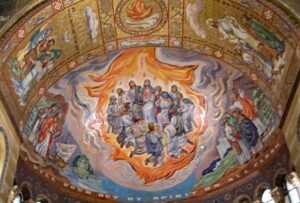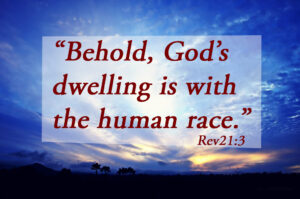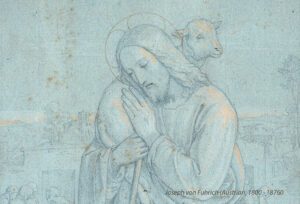“Thus says the Lord GOD:
I myself will look after and tend my sheep.
As a shepherd tends his flock
when he finds himself among his scattered sheep,
so will I tend my sheep.” Ezekiel 34:11-12
“‘Come, you who are blessed by my Father.
Inherit the kingdom prepared for you from the foundation of the world.
For I was hungry and you gave me food,
I was thirsty. . . .'” Matthew 25: 31-46
In the First Reading, written when the Israelites were living in exile and suffered the destruction of their beloved temple, Ezekiel tells them they must remember that God is their true shepherd. According to the USCCB’s Bible note on the above Gospel passage, the “rejected ones” (the hungry, thirsty, etc, are the disciples whose teaching was (is) rejected by many (ourselves included) because their teaching doesn’t say what they (we) want it to say. (Click the “*” on Mt 25:31-46, the Judgement of the Nations* for the entire note cited here.)
“The criterion of judgment will be the deeds of mercy that have been done for the least of Jesus’ brothers (Mt 25:40). A difficult and important question is the identification of these least brothers.. . . . A strong case can be made for the view that, in the evangelist’s sense, the sufferers are Christians. . . whose sufferings were brought upon them by their preaching of the gospel.”
As we end this Liturgical Year, let us reflect on what we see as we gaze upon so much darkness around us – darkness in the world, in our beloved Church and in ourselves. First, can we still see that God is our true and only dependable Shepherd? And, second, in what ways have we fallen into rejecting any disciple whose preaching includes parts of Jesus’ message that go against the way we do and want to continue to think, live and act? In other words, how have I been called to conversion during this past year? For clues, this Gospel passage says we should consider the Gospel-based message(s) of the people we find ourselves not wanting to feed and clothe. Wanting to feed and clothe these disciples is a deeper conversion than wanting to feed and clothe our materially poor sisters and brothers.
+++++
The rest of this post should be of special interest to our St. Michael Bible Study participants who have only one more session of the 24-session Yale University online Old Testament course. The last several sessions we viewed and discussed were on the Book of Ezekiel and other books written in the post-Babylonian Exile era.
A DIFFERENT TRANSLATION OF THE ABOVE PASSAGE FROM EZEKIEL
The above Lectionary First Reading from the Book of Ezekiel differs slightly from this USCCB’s Bible translation:
“For thus says the Lord GOD: Look! I myself will search for my sheep and examine them.
As a shepherd examines his flock
while he himself is among his scattered sheep,
so will I examine my sheep.
I will deliver them from every place
where they were scattered on the day of dark clouds.” Ezekiel 34:11-12
HINTS AND AIDS FOR EXPLORING BIBLE PASSAGES
In reading the Bible, try to read portions of the text that come immediately before and after the Lectionary Reading and also read the notes that appear at the bottom of the pages. For instance, at the beginning of Chapter 34, we see a section heading that indicates that this Lectionary Reading is part of a passage of instructions to Shepherd. And the note on Chapter 34, verse 2 gives more of a context to the above passage.
“Woe to the shepherds of Israel who have been pasturing themselves and not their sheep!” Ezekiel 34:2
* |34:2| Shepherds: the leaders of the people. A frequent title for kings and deities in the ancient Near East; the ideal ruler took care of his subjects and anticipated their needs. Ezekiel’s oracle broadens the reference to include the whole class of Jerusalem’s leaders (v. 17). The prophet assures his audience, the exiles in Babylon, that God holds these leaders responsible for what has happened to Jerusalem and will give Israel a new shepherd worthy of the title.
+++++
MINOR DIFFERENCES: USCCB BIBLE TRANSLATIONS AND THE LECTIONARY TRANSLATIONS
The following information is for those of you who would like to know why the wording of the First Reading is slightly different from that of the translation found in the www.usccb.org Bible.
THE TRANSLATION IN THE LECTIONARY – THE READINGS YOU HEAR AT MASS
You may not have ever thought about it, but the Lectionaries, those books used for the Mass Readings have to be published in many different languages and distributed all over the world. These translations change slightly from time to time, but fortunately not too frequently. When a change occurs, you can imagine how long it takes to have those new translations put into all of the different languages and new lectionaries created, distributed and promulgated for use in the liturgical celebrations. Below is some information and references on recent versions of the lectionary and the Bible.
From “Various Editions of the Catholic Lectionary for Mass” Felix Just, S.J., Ph.D
USL98 = Lectionary for Mass: For Use in the Dioceses of the United States of America: Second Typical Edition. |various publishers|, 1998. – Volume I (Sundays, Solemnities, Feasts of the Lord and the Saints).
USL02 = Lectionary for Mass: For Use in the Dioceses of the United States of America: Second Typical Edition. |various publishers], 2002. – Volumes II-IV:
- Volume II: Proper of Seasons for Weekdays, Year I; Proper of Saints; Common of Saints;
- Volume III: Proper of Seasons for Weekdays, Year II; Proper of Saints; Common of Saints;
- Volume IV: Common of Saints; Ritual Masses; Masses for Various Needs; Votive Masses; and Masses for the Dead.
USL98-02 = an abbreviation sometimes used to refer to all four of the above volumes together..
Note: USL98-02 are based on the New American Bible (NAB), an English translation based on the Hebrew and Greek texts. USL70 closely follows the 1970 NAB edition throughout; USL98-02 uses the 1986 revised New Testament of the NAB, but the text for Old Testament readings is almost the same as in USL70, since the revision of the Old Testament portion of the NAB (which has been in process for many years!) was not yet finished. The English texts printed in USL98-02 sometimes differ slightly from the NAB, since minor changes were made by the USL translation committee and approved by the US Bishops Conference and the Vatican; the biblical references, however, are the same.
New American Bible (NAB) and New American Bible Revised Edition (NAB-RE):
The Catholic Company, a privately owned company and not affiliated with the USCCB, has this explanation of the difference between these two versions of the NAB.
“The New American Bible (NAB) was first published in 1970. The New American Bible is one of three Catholic Bibles approved for use in the liturgy, and is the official translation of the U.S. Conference of Catholic Bishops. The New American Bible is the most common Bible translation in the United States. The NAB is a good choice for those whose studies closely follow the Mass or who like a Catholic Bible that is easy to read for daily use. The NAB may also be a good choice when looking for a youth Bible. The New American Bible also makes a wonderful gift Bible for any occasion.
“The current NAB Catholic Bible in print, the New American Bible Revised Edition (NAB-RE), includes the 1986 edition of the New Testament and a revised version of the Old Testament which was released in 2011. This work took over 20 years to be completed by nearly 100 theologians and scholars which included bishops, revisers, and editors. The New American Bible Revised Edition (NAB-RE) was sponsored by the Confraternity of Christian Doctrine. All current NAB Bibles contain this revised and updated text which has not yet been similarly updated in the Mass readings found in the current lectionaries and missals.”




